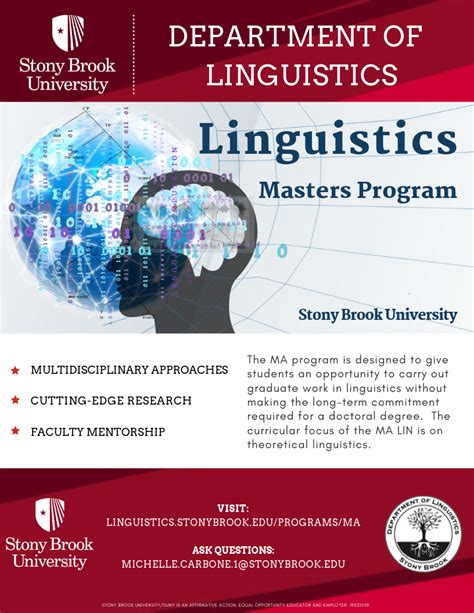Are you fascinated by languages and the way they shape our world? If so, you may be interested in pursuing a degree in linguistics. In recent years, linguistics programs have been gaining popularity among students due to the diverse and exciting opportunities they offer. From studying the structure and evolution of languages to delving into the cognitive processes behind communication, linguistics programs provide a unique and interdisciplinary approach to understanding human language.
In this blog post, we will explore the growing popularity of linguistics programs in American universities and provide a comprehensive guide to help you navigate through the various aspects of these programs. From understanding the curriculum and essential courses to choosing the right program for your interests and career aspirations, we will cover it all. Additionally, we will discuss the specializations, research opportunities, internship experiences, and career prospects available to linguistics graduates. Whether you are considering pursuing a degree in linguistics or are already enrolled in a program, this post will provide valuable insights and resources to help you make informed decisions and set yourself up for success in the field of linguistics. Stay tuned for an in-depth exploration of linguistics programs and the exciting future trends in this field.
Table of Contents
Why linguistics programs are becoming popular
As the world becomes more interconnected and the demand for multilingual communication grows, the study of linguistics has become increasingly popular among students.
With the rise of globalization, there is a greater need for individuals who can navigate and understand various languages and cultures. This has led to a surge in interest in linguistics programs as students seek to gain the skills and knowledge necessary to thrive in our diverse and rapidly changing world.
Furthermore, the field of linguistics is not only relevant to language acquisition and communication, but it also intersects with other disciplines such as cognitive science, anthropology, and computer science, making it a versatile and interdisciplinary area of study.
Overall, the growing popularity of linguistics programs can be attributed to the increasing need for individuals who possess linguistic expertise and cross-cultural competence in today’s globalized society.
Exploring the curriculum of linguistics programs
When considering pursuing a degree in linguistics, it is essential to understand the curriculum of linguistics programs. These programs typically provide students with a well-rounded education in the field of linguistics, covering a wide range of topics related to language and communication.
Students enrolled in linguistics programs can expect to take courses that focus on areas such as phonetics, syntax, semantics, and sociolinguistics. These courses provide students with a deep understanding of the structure and function of language, as well as the social and cultural aspects of communication.
Additionally, many linguistics programs offer specialized courses in areas such as psycholinguistics, computational linguistics, and historical linguistics. These courses allow students to explore specific areas of interest within the field and gain expertise in particular subdisciplines.
Overall, the curriculum of linguistics programs is designed to provide students with a comprehensive understanding of the nature of language and communication, as well as the skills and knowledge needed to pursue a career in the field of linguistics.
The essential courses in linguistics programs
When choosing a linguistics program, it’s important to understand the essential courses that will be offered. These courses form the foundation of your education and provide you with the necessary skills and knowledge to succeed in the field of linguistics.
Introduction to Linguistics: This course is the cornerstone of any linguistics program. It provides students with an introduction to the basic concepts and methods of linguistic analysis. Students will learn about the structure of language, language variation, and the principles of linguistic analysis.
Phonetics and Phonology: Understanding the sounds of language is crucial for any linguist. This course will cover the study of speech sounds and their production, as well as the organization of these sounds in different languages. Students will learn about the articulation and acoustic properties of speech sounds, as well as the phonological patterns in different languages.
Syntax and Semantics: In this course, students will delve into the study of sentence structure and meaning. They will learn about the rules that govern the formation of sentences in different languages, as well as the interpretation of these sentences. Through analyzing syntax and semantics, students will gain a deeper understanding of language and its structure.
Practical Applications in Linguistics: This course focuses on applying linguistic theories and methods to real-world situations. Students will learn about language acquisition, sociolinguistics, and language variation, and how these concepts can be applied to different contexts such as education, healthcare, and technology.
How to choose the right linguistics program for you
When considering a linguistics program, it’s important to evaluate your own goals and interests in order to find the right fit for you. One of the first factors to consider is the program’s curriculum. Look for programs that offer a variety of courses in different areas of linguistics, such as phonetics, syntax, semantics, and sociolinguistics. This will allow you to explore the diverse aspects of language and find your niche within the field.
Another important factor to consider is the faculty in the linguistics program. Research the backgrounds and areas of expertise of the faculty members to ensure that they align with your interests. A faculty with diverse research interests can provide you with valuable mentorship and guidance as you navigate your own academic and career path in linguistics.
It’s also crucial to consider the research opportunities and specializations offered by the program. Look for programs that allow you to engage in meaningful research projects and offer opportunities for specialization in areas such as computational linguistics, language acquisition, or historical linguistics. By choosing a program that aligns with your research interests, you’ll be able to cultivate a strong academic foundation and make meaningful contributions to the field.
Lastly, consider the location and resources of the program. Look for programs located in areas with vibrant linguistic communities and access to relevant resources such as libraries, archives, and research centers. Additionally, take into account the funding and scholarship options available to support your academic pursuits. By carefully evaluating these factors, you can choose the right linguistics program that will empower you to achieve your academic and professional goals.
Specializations and research opportunities in linguistics programs
When choosing a linguistics program, it’s important to consider the specializations and research opportunities available.
Many linguistics programs offer specialized tracks or concentrations within the field, such as sociolinguistics, psycholinguistics, computational linguistics, and applied linguistics. These specializations allow students to focus their studies on a particular area of interest and gain specialized knowledge and skills.
Additionally, research opportunities play a vital role in linguistics programs. Many programs offer research assistantships, independent study opportunities, and access to cutting-edge research facilities. These research opportunities provide students with hands-on experience in conducting linguistic research and contribute to the advancement of the field.
Overall, the specializations and research opportunities in linguistics programs allow students to tailor their education to their interests and goals, while also gaining valuable research experience.
Internship and fieldwork experiences in linguistics programs
Internship and fieldwork experiences are crucial components of a linguistics program, as they provide students with practical, hands-on experience in the field. These opportunities allow students to apply their theoretical knowledge to real-world situations, gaining valuable insight into the diverse applications of linguistics.
Many linguistics programs offer internship opportunities with organizations and companies that focus on language development, speech therapy, translation, and interpretation. These experiences not only provide students with professional connections and valuable references but also enable them to explore different potential career paths within the field of linguistics.
Fieldwork experiences, on the other hand, involve conducting research in naturalistic settings, such as language communities or cultural groups. This hands-on approach allows students to observe and analyze language in its natural environment, gaining a deeper understanding of language use and behavior.
In addition to providing practical skills and experiences, internships and fieldwork opportunities in linguistics programs also enhance students’ resumes and make them more competitive in the job market. Employers value candidates who have practical experience in addition to academic knowledge, making these experiences an essential part of a well-rounded linguistics education.
Career prospects for linguistics graduates
With a degree in linguistics, graduates have a wide range of career prospects available to them. One potential career path is in speech and language therapy, where linguistics knowledge can be applied to help people with speech and language disorders. Strong communication skills, an understanding of phonetics, and language development are all skills that are relevant to this field.
Another potential career path for linguistics graduates is in education. With their understanding of the structure and use of language, they are well-equipped to teach English as a second language, work in literacy programs, or even become language educators. Additionally, careers in translation and interpretation are also viable options for linguistics graduates, especially for those who are proficient in multiple languages.
For those interested in technology, a linguistics background can also lead to opportunities in computational linguistics, natural language processing, and speech recognition. These fields involve using technology to study and analyze language, as well as develop applications like voice recognition software or language learning apps.
Finally, linguistics graduates may also find fulfilling careers in research, working in academia, or pursuing advanced degrees in linguistics, psychology, cognitive science, or related fields. The critical thinking, data analysis, and research skills developed in a linguistics program can be applied to various research settings, including government agencies, non-profit organizations, and private research firms.
Top-rated linguistics programs in American universities
When it comes to pursuing a degree in linguistics, choosing the right program is crucial for your academic and professional success. American universities offer a wide range of linguistics programs, each with its own unique features and strengths. For students aspiring to study linguistics at the undergraduate or graduate level, it’s important to consider the top-rated programs available in the United States. These programs are known for their high-quality faculty, comprehensive curriculum, and excellent research opportunities.
One of the top-rated linguistics programs in American universities is the Department of Linguistics at Stanford University. Ranked among the best in the country, Stanford’s linguistics program offers a diverse range of courses covering phonetics, syntax, semantics, and psycholinguistics. The department’s faculty are renowned experts in their respective fields, and students have the opportunity to engage in innovative research projects.
Another top-rated program is the Department of Linguistics at Harvard University. With a rich tradition of linguistic research and scholarship, Harvard’s program provides students with a solid foundation in theoretical and empirical linguistics. The department’s interdisciplinary approach to language study allows students to explore the complexities of linguistic structure and meaning from different perspectives.
For those interested in computational linguistics, the program at the Massachusetts Institute of Technology (MIT) is highly regarded. MIT’s linguistics program combines cutting-edge research in natural language processing, machine learning, and linguistics, offering students the opportunity to work on groundbreaking projects at the intersection of language and technology.
Scholarships and funding options for linguistics programs
When considering pursuing a degree in linguistics, it’s essential to explore the various scholarships and funding options available to help ease the financial burden of education. Fortunately, there are numerous opportunities for students interested in linguistics to obtain financial assistance.
Scholarships specifically for linguistics programs are offered by universities, private organizations, and government agencies. These scholarships may be based on academic merit, financial need, or specific linguistic interests. Many universities also offer departmental scholarships for linguistics students, which can help cover tuition costs and living expenses.
Additionally, students pursuing a degree in linguistics may be eligible for grants and fellowships provided by research institutions and linguistic organizations. These opportunities can provide funding for research projects and academic pursuits, allowing students to further their studies without financial constraints.
Furthermore, it’s important for students to explore financial aid options such as student loans, work-study programs, and tuition assistance. By leveraging these resources, linguistics students can access the financial support needed to pursue their academic and professional goals.
Future trends in linguistics programs and research
The field of linguistics is constantly evolving, and as we move into the future, there are several trends that are shaping the landscape of linguistics programs and research. One of the most significant trends is the increasing focus on interdisciplinary studies within linguistics programs. As the boundaries between different fields of study become more blurred, linguistics is collaborating with disciplines such as psychology, neuroscience, and computer science to gain new insights into language and communication.
Another trend that is shaping the future of linguistics programs is the integration of technology. With the rise of big data and machine learning, linguists are using computational tools to analyze linguistic patterns and language acquisition. This shift towards data-driven research is helping linguists to uncover new findings and understand linguistic diversity in a more comprehensive way.
In addition, the future of linguistics research is likely to see a greater emphasis on global perspectives. As the world becomes increasingly interconnected, linguists are recognizing the importance of studying languages and communication in a global context. This trend is expected to lead to more cross-cultural studies and a deeper understanding of multilingualism and its societal implications.
Overall, the future of linguistics programs and research is characterized by collaboration, technology integration, and global awareness. These trends are shaping the way linguists approach the study of language and communication, and are likely to lead to new breakthroughs and discoveries in the field.






